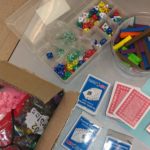Our amazing guidance department has combined together to put on events for Mental Health month throughout May. There have been lots of events each day during lunch, and experts brought in to talk to the staff and answer questions. While all of the events are valuable, I think the most memorable event was the student health panel during our two town halls. There’s still programming left for next week, so maybe more good things were in store, but this panel looks to be the most memorable for a number of reasons.
First off the student health panel was great for the 9 students who were brave enough to sit on the stage and open up to the school. Some kids were shaking as the panels started, while others were bubbling with nervous laughter. Everyone was ready to do this, but ‘this’ was certainly not a normal event. Between these students there were some 20+ different diagnoses, including Obsessive Compulsive Personality Disorder to Bulemia to Depression, with many people having one kid. A counselor served as moderator and asked three questions:
- Introduce yourself, and as much about your condition(s) that you want to share.
- Describe your mental illness. How does it affect you, what do you do to cope?
- What are things at the school that help you?
Once the questions were asked, panel members took all the time they needed to explain their situation.
It was amazing to see these kids up there detailing their struggles, and their traumas, and their approach to handling it, in front of a huge group of kids. Each time a student responded to a question they were met with rounds of applause, and occasional cheering. The effect of the audience’s outpouring was visible as members of the panel relaxed and started to let their guards down. The audience also became more interested and more engaged as each person spoke, and cheered more when they finished. It was a great display of empathy on the part of the audience. The weeks of activities leading up to this, as well as the on going work of our guidance department, really helped to create this culture. Deep down, most kids have the capacity for empathy, even though they don’t show it. This event gave everyone a chance to put theirs to use.
At the same time, I’m aware that not every kid thinks kindly about people with mental illness. Stigma against mental illness pervades our society, so I’m sure it was operating in that auditorium perhaps among some of the quiet kids sprinkled through the auditorium. It’s not their fault. The idea of writing off or being hostile towards mental illness has a long history, and comes from a lot of different places. That doesn’t mean it makes sense. Especially now that we have the plethora of ways to treat mental illness. Some people, who could benefit from treatment, avoid it and live a much more difficult life without it, all just to avoid the label “Mentally Ill”. This kind of stuff is deep and hard to mandate that people change. Through the school’s work in creating this culture, hopefully there is an environment that will force people to question stigma and the ideas that come from it. In the auditorium this week, it was clear that the stigma was not in the majority and hopefully it will spark a change in the minds of the quiet kids sprinkled through the auditorium.
The kids requested a staff member be on stage, and I jumped at the opportunity. It’s a habit I’ve held since March of 2003 when I just left the hospital after a week’s stay following a manic episode. When someone asked me, “where were you?” I wouldn’t make up a story or change the subject. I’d say, “I was in the mental hospital because I have manic depression.” At the time it was practical. Life was hard enough trying to catch up with classes, I didn’t to create some elaborate story of my whereabouts that week. So I told people straight whenever it came up, and I continued to do so until I started working. Lots of fears kept me from revealing my illness to coworkers and all but a handful of students, at least until the town hall committee started looking for volunteers.
If you’re a teacher and you have a mental illness, let me say why it might be useful for you to share it with your school as well. When kids come back from a mental hospital, or share that they are going to therapy or trying out new medication, it is always helpful for them to know that an adult has gone through similar stuff, and was able to finish college and get a job, etc. It’s also valuable for you. Society forces us to hold so much in about our conditions, it’s rare when you get a chance to use your condition as a way to help someone. It’s personally uplifting when I get a chance to talk through the side effects of whatever a kid is taking, or get to point them to resources that can help them. My school is really supportive, so I may have a different view of things than most. In some schools stigma is the dominant voice around mental illness issues. This may be coming from the captain of the football team, and it could also come from some of the adults. It may not feel safe to be totally open around all the people of the school. Definitely pick your spots. But for one or two students it could be super valuable.
To close it out, here’s an email that I got from a student who sent this as I was writing this that speaks to how valuable opening up can be:
Hi, I really want to say thank you for being able to participate in the town hall yesterday. I really don’t really enjoy them, but yesterday it really had me appreciate it because normally I would expected that the student would be talking about mental illness. I never would of expected you to get up there and speck about your illness. I too deal with depression and anxiety disorder and I am on medication too. It had me appreciate that every one of us have own stories. I thank you again for being so bold and so courageous…



